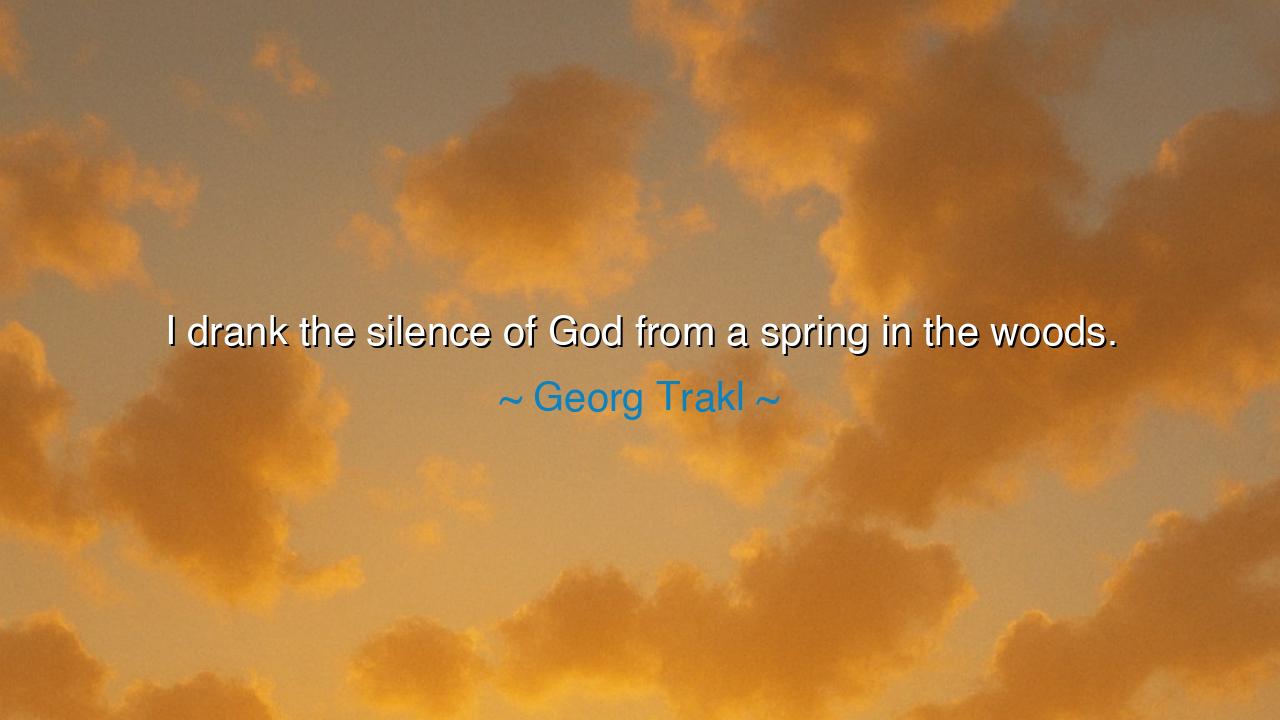
I drank the silence of God from a spring in the woods.






Georg Trakl, the poet of shadows and stillness, once wrote: “I drank the silence of God from a spring in the woods.” In this brief utterance lies a vision both mystical and eternal. He speaks not of drinking water alone, but of tasting the deep and hidden peace that flows beneath the turmoil of the world. The silence he names is not emptiness, but fullness — the quiet breath of the divine, present in the murmurs of creation. To find it is to discover a spring: pure, hidden, life-giving, offering refreshment to the weary soul.
The ancients would have nodded in recognition, for they too sought God in the wilderness, not in the noise of markets or the clang of cities. Moses found the burning bush upon a lonely mountain. Elijah heard not the divine voice in wind, fire, or earthquake, but in the still small silence. The hermits of the desert fled the crowded world to drink from this same hidden spring, finding in silence not absence, but the presence of eternity. Thus, Trakl speaks with the timeless voice of one who has tasted what cannot be seen.
This quote also speaks of contrast — the woods, untouched and ancient, against the clamors of human society. Trakl himself lived in a time of great upheaval, the world staggering toward the abyss of war. Perhaps it was in such an age that he fled to the forest, longing to drink something unspoiled, something eternal. And what he found was not merely solitude, but the silence of God, a truth deeper than words, a stillness that heals. His words remind us that when the world is loud with cruelty and confusion, the soul may yet find nourishment in nature’s quiet sanctuaries.
History, too, bears witness to such encounters. When Siddhartha Gautama sat beneath the Bodhi tree, it was not in noise but in profound stillness that enlightenment came. He, too, drank the silence of the eternal, not from a literal spring, but from the fountain of awareness within. His teaching spread across kingdoms, yet its root was the same truth Trakl names: that divine wisdom is often heard not in thunder, but in the quiet rhythm of breath, wind, and flowing water.
The meaning of the poet’s words, then, is not confined to religion or to poetry alone. It is a call to each of us to seek moments where we may also drink the silence of God. It may be in the heart of the forest, or beside a river, or even in the stillness of our own rooms. To drink such silence is to taste renewal, to remember that beyond the storm of our days there flows a deeper order, calm and eternal, waiting for us to return.
The lesson is clear: if we would be wise, we must seek silence as a spring of life. Too often, men and women flee from stillness, filling their hours with noise and distraction. But without silence, the soul withers. If you would grow, take time to walk in nature without words, to sit beneath a tree, to hear the language of the wind and the murmur of leaves. In these moments, you too may drink of the same spring, tasting the God who dwells beyond sound.
Practically, let this become a discipline: carve out moments of stillness in your day. Rise before dawn and listen to the hush of morning. Step into a grove or a garden and breathe deeply. Set aside the constant clamor of devices and voices, and allow your spirit to drink. For in that quiet, wisdom ripens; in that silence, strength returns. What Trakl found in the woods, you too may find wherever you dare to seek it.
Thus remember his words: “I drank the silence of God from a spring in the woods.” They are not the musings of a solitary poet only, but a guide for all generations. For silence is not the absence of life — it is its purest presence. Whoever drinks of it will never thirst for mere noise again, but will walk in the world with peace, carrying within them the eternal hush of the divine.






AAdministratorAdministrator
Welcome, honored guests. Please leave a comment, we will respond soon